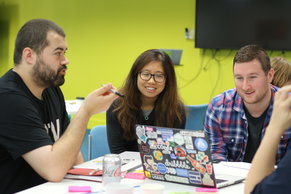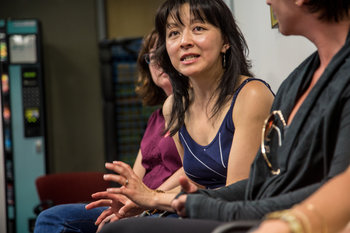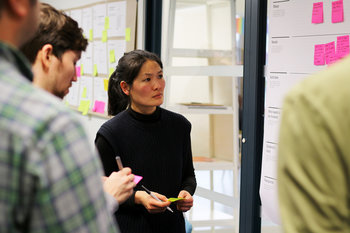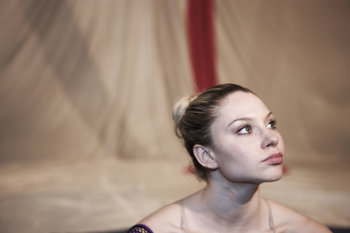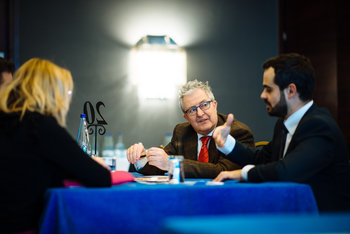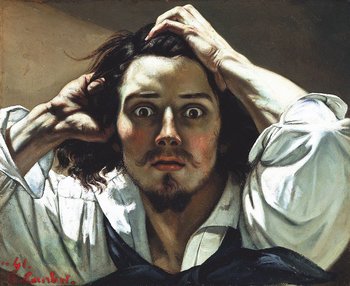
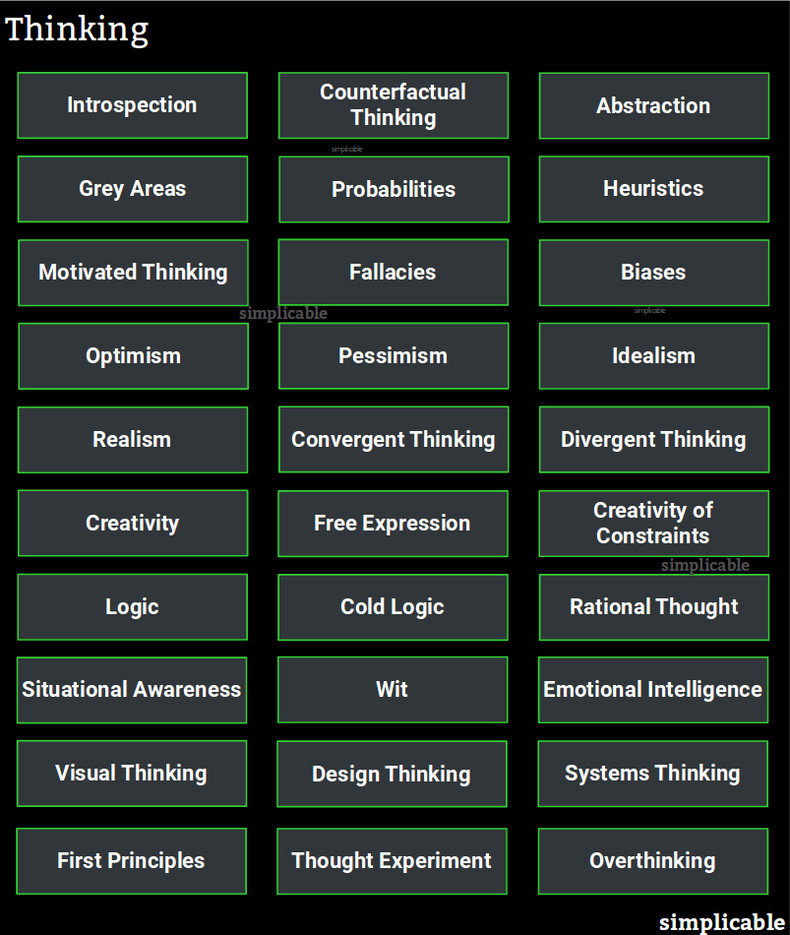
Introspection
The process of examining your own character, ideas, motivations and emotions.An individual who is able to identify their own failings each day to work towards self-improvement.
Counterfactual Thinking
Imagining how the past could have been different. Often used as a process of self-improvement by identifying approaches that might work in the future. This can obviously go too far whereby an individual ends up dwelling in the past.An individual performs poorly in an important conversation with their boss and replays the conversation in their head to imagine things they could have said.
Abstraction
Thinking in terms of concepts and generalizations.A concept such as play is an abstraction.
Grey Areas
The ability to consider degrees of truth.A teacher who can see that a student's idea has some merit despite not being the "correct" answer.
Probabilities
Developing estimates of future events.A student feels they have a 10% chance of getting into their top two choices of school so they apply to a third choice they that is almost certain to accept them.
Heuristics
People tend to think in approximations known as heuristics that sacrifice accuracy for speed.Restaurants that don't look busy on Friday night aren't likely to be good.
Motivated Thinking
Motivated thinking is an attempt to find facts that fit what you want to believe as opposed to an objective process of letting the facts shape your thinking.A student thinks of reasons that university is useless because they don't want to study for an entrance exam.
Fallacies
A fallacy is flawed logic. These can be surprisingly difficult to identify. As such, one of the primary elements of logical thinking is the ability to identify fallacies in arguments. The following is an example of a fallacy known as affirming the consequent.Rule: If Sue passes the test, she will be happy.
Fact: Sue is happy.
Conclusion: Sue passed the test.
The conclusion above is wrong because Sue might be happy for some other reason. In other words, the rule on the first line can't be applied in reverse.Fact: Sue is happy.
Conclusion: Sue passed the test.
Biases
Biases are repeated patterns of thought that produce errors of judgement. For example, circular reasoning whereby you attempt to prove a statement with itself.That school is elitist because it is full of snobs.
Optimism
Optimism is a thought process that focuses on positives or underestimates risk.A entrepreneur who brainstorms wild ideas they have without any validation or constraint.
Pessimism
Pessimism is a thought process that focuses on negatives and overestimates risk.An entrepreneur who brainstorms risks and problems with their ideas as a means of defensive pessimism.
Idealism
Idealism is the theory that the world is a product of ideas and not the other way around.A science fiction writer who imagines a utopia to paper in the hopes that it will one day become a reality.
Realism
Realism is the idea that physical reality is uninterested in human ideas and has a nature of its own that can be measured and modeled.A scientist performs an in vitro experiment to determine if a particular type of honey destroys a particular type of bacteria.
Convergent Thinking
Convergent thinking is the process of applying known methods to a problem to determine a solution.An engineer uses calculus to determine the flextual strength of an aircraft wing.
Divergent Thinking
Divergent thinking is the process of challenging established knowledge or solving problems in areas that have no known solution.An artist challenges the norms and complacency of their peers to lead a way forward with a new style that defines their time.
Creativity
Creativity is the pursuit of new ideas that are non-obvious.A farming community brainstorms ideas to increase the yield of an organic crop.
Free Expression
Unconstrained creativity.A musician has a vague image of a song in their head that they pursue.
Creativity of Constraints
Creativity that is not the result of free expression or brainstorming but rather an intensive process of solving a problem with well defined constraints.An architect needs to develop a proposal for a school building that impresses stakeholders given a set of 100 requirements and a fixed budget of $3 million.
Logic
Logic is a formal system of thinking that uses techniques such as inductive reasoning whereby theories are developed based on a set of facts.A farmer looks at data related to weather, soil, seed, chemicals and environment to develop a theory as to why yield was particularly low in a season.
Cold Logic
Cold logic is an attempt to solve a problem by excluding human realities that make the problem complex.A politician proposes that people in a region immediately cease slash and burn agriculture that has sustained families for generations without any realistic proposal as to how these communities should survive.
Rational Thought
Thought processes that others would view as reasonable. This is generally used for thought that is both logical and realistic given a human context.A politician proposes that a government provide incentives to farmers to change their practices in ways that are beneficial to environment and health.
Situational Awareness
High speed thought processes that apply to a moment.A bicyclist sees that a driver looks distracted such that they stop at an intersection despite having the right of way.
Wit
Wit is the ability to be intelligent in high speed social situations whereby there is a short opportunity to say something perfect.Lady: If I were your wife I'd put poison in your coffee.
Man: If I were your husband I'd drink it.
~ Appears around 1899 as a joke or humorous anecdote. Origin unclear. Often misattributed to Lady Nancy Astor and Winston Churchill.
Man: If I were your husband I'd drink it.
~ Appears around 1899 as a joke or humorous anecdote. Origin unclear. Often misattributed to Lady Nancy Astor and Winston Churchill.
Emotional Intelligence
Emotional intelligence is the ability to read emotion and respond in a functional way.A salesperson can see that a customer feels ignored when their partner dominates the conversation so they make several attempts to engage the customer to make them feel included in hopes of closing a deal.
Visual Thinking
Visual thinking is the process of thinking in pictures as opposed to words.An architect visualizes the massing of a building in their head.
Design Thinking
Design thinking is the process of solving problems and making decisions by creating things.A city addresses a problem of childhood obesity with play streets and parks that give most children in the city a place to play outside that is close to their home.
Systems Thinking
Systems thinking is the process of considering the broad end-to-end impacts of changes to complex systems such as an economy, ecosystem or society.A farmer experiments with companion plantings in a particular terroir to determine what combinations increase yield and to try to detect any unintended consequences of yield improvement efforts.
First Principles
Thinking in terms of well established theories that have broad explanatory power.A farmer who seeks to reduce the environmental impact of their farm with the principle of waste is food such that they evaluate all strategies and methods against the idea that the farm shouldn't produce any waste that isn't food for an organism.
Thought Experiment
Using an simple analogy to solve a relatively complex problem.A girl knows that one of her 3 best friends is gossiping about her at school by sharing her most trusted secrets. She gives each of the three friends a slightly different version of a story and waits to see which version surfaces as gossip.
The thought experiment above can be used to design sophisticated information security solutions such as honeypots that are used to automatically identify threats.Overthinking
Overthinking is the process of spending too much time on a problem or making it more complex than it needs to be with excessive abstraction or consideration of obscure details.A customer spends hours comparing obscure product specifications only to make the purchase decision based on the fact that only one of the products has a feature the customer absolutely needs. This fact was known to the customer within the first 2 minutes of research.












